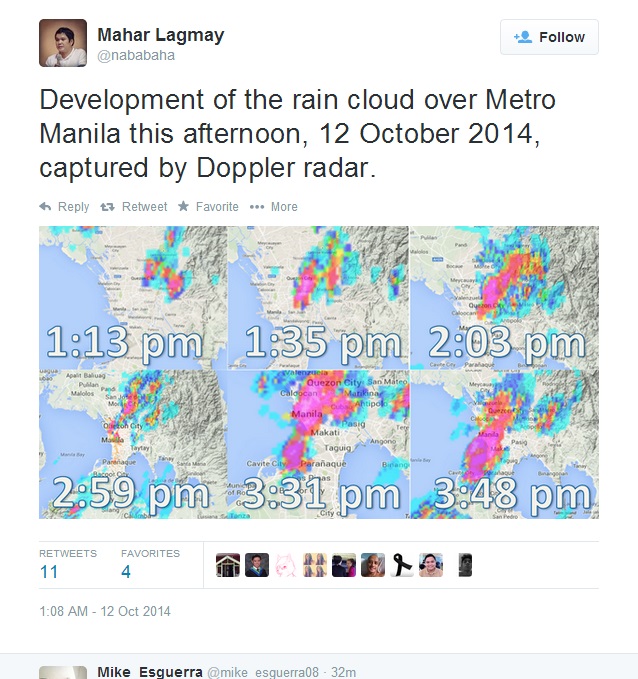MANILA, Philippines – The state weather bureau on Sunday afternoon said localized thunderstorms were affecting Metro Manila and nearby provinces, resulting in heavy rains and flooding.
The Metro Manila Development Authority, meanwhile, reported some flooded areas in the metropolis:
-FLOOD ALERT: As of 4:14 PM knee deep at ESPAÑA Lacson WB/EB, not passable to light vehicles.#mmda
-FLOOD ALERT: As of 4:14 PM knee deep at ESPAÑA Vicente Cruz WB/EB, not passable to light vehicles.#mmda
-FLOOD ALERT: As of 4:14 PM knee deep at ESPAÑA Antipolo WB/EB, not passable to light vehicles.#mmda
-FLOOD ALERT: As of 3:54 PM knee deep at Quezon Avenue Biak na Bato EB, not passable to light vehicle.#mmda
-FLOOD ALERT: As of 3:54 PM half tire at Quezon Avenue Biak na Bato WB, not passable to light vehicles.#mmda
The Philippine Atmospheric, Geophysical and Astronomical Services Administration (Pagasa) clarified that there is currently no typhoon in the Philippine area of responsibility.
It said over social media that their recent forecasts showed a high probability of rainfall with thunder and lightning during the afternoon and until early evening.
Pagasa’s 2:50 p.m. advisory said the thunderstorm will persist for about two hours over Metro Manila, Nueva Ecija, Zambales, Bulacan (San Miguel, Norzagaray, San Jose del Monte), Rizal (Rodriguez, San Mateo, Antipolo, Cainta, Teresa), and Cavite (Naic, Maragondon, Magallanes, Gen. Emilio Aguinaldo, Indang).
Pampanga, Tarlac and other areas of Bulacan, Rizal and Cavite will also be affected.
Project NOAH head Mahar Lagmay noted on Twitter that the raincloud over Quezon City has started growing bigger and moving north.
Flooding has already been reported in Makati and Quezon City.
Stuck with outdated drainage systems, Metro Manila has been hit by ever-worsening floods. Population growth, inadequate infrastructure, corruption, deforestation and even trash build-up combine to exacerbate the impact. It’s a trend experts expect to continue.
